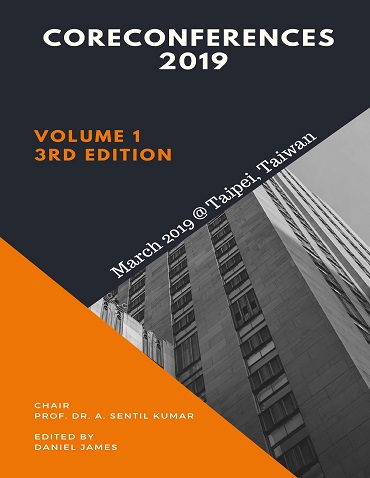- Publication Meta:Value
- Short Title:CC Batch A 2019
- Publisher:ASDF, India
- ISBN 13:978-93-88122-06-1
- ISBN 10:93-88122-06-2
- Language:English
- Type:Hard Bound - Printed Book
- Copyrights:CC Batch A Organizers/DCRC, London, UK
- Editor-in-Chief:Dr A Senthilkumar
- Conference Dates:20 - 21, March 2019
- Venue Country:Taipei, Taiwan
- Submitted Papers:227
- Acceptance Rate:8.51%
- Website:www.coreconferences.com
Welcome to ASDF Electronic Digital Library!
CoreConferences 2019
CoreConferences 2019
International Conference on Cyber Security and Connected Technologies 2019
Paper 013
Families of Strongly Asymmetric Public Key Agreement SAA-5 and Its Performance
Daiki Homma1, Satoshi Iriyama2
1,2Tokyo University of Science, Noda, Japan
Abstract
A new class of public key agreement (PKA) algorithm was introduced, and its breaking complexity was discussed essentially in the previous paper. The algorithm is constructed by non–commutative algebra, for example, finite dimensional matrices and vectors. The asymmetry helps to increase its security and appends flexibility of computational requirements between the sender and the receiver. In the case of creating secret shared keys, for instance, between a server and a smartphone, the computational abilities are difference. The algorithm to create key for the smartphone is lighter for calculation and memory usage than for the server. The strongly asymmetric PKA with a larger key length is one of efficient algorithms for such biased environments. Moreover, we evaluated the breaking complexity mathematically assuming that the computational cost for the discrete logarithm is zero. In this study we review its mathematical description and examples of implementation. Moreover, we discuss its performance comparing the other standard PKAs.
Keywords
Author's Profile
Author profile can be generated and linked through our partners World Book of Researchers. To include your profile online Click Here. After it is approved, please email to edlib @ asdf.res.in to create a link with all the papers.
e-AID
CoreConferences.2019.013
Cite this Article as Follows
Daiki Homma, Satoshi Iriyama. Families of Strongly Asymmetric Public Key Agreement SAA-5 and Its Performance. International Conference on Cyber Security and Connected Technologies (2019): 07. Print.
© 2010 - by EDLIB .
All Rights Reserved.

